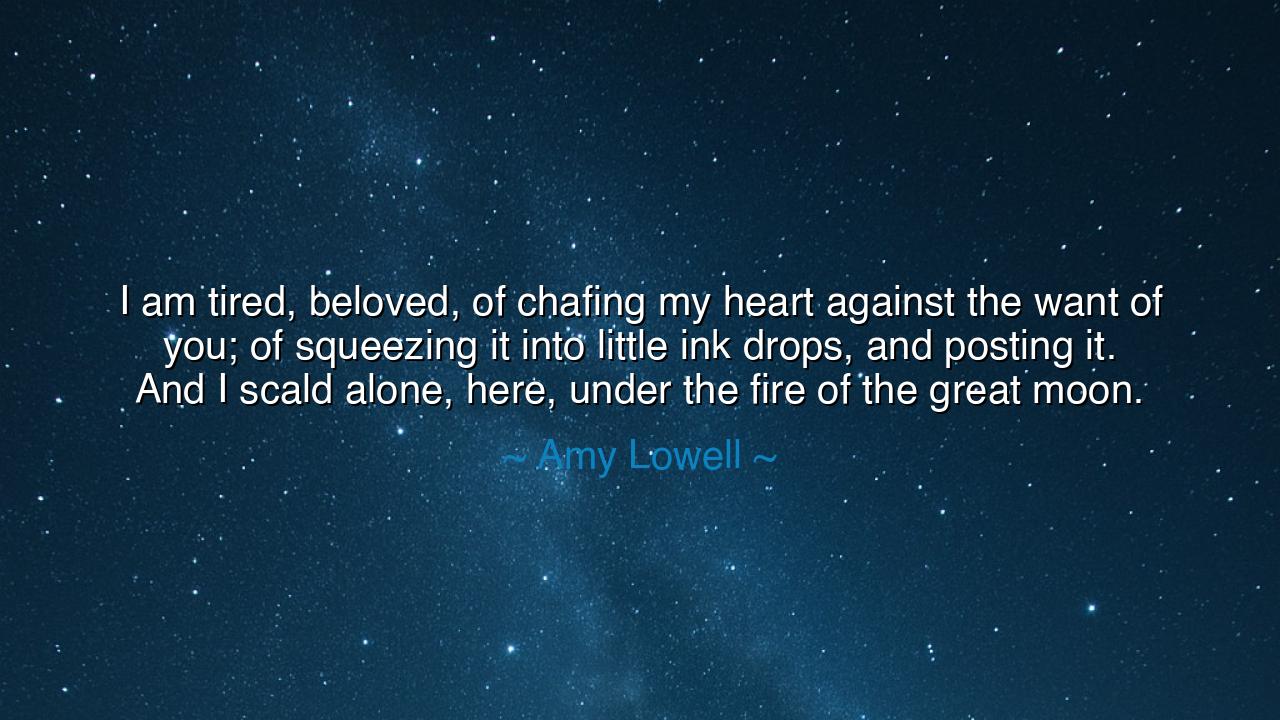
I am tired, beloved, of chafing my heart against the want of you;
I am tired, beloved, of chafing my heart against the want of you; of squeezing it into little ink drops, and posting it. And I scald alone, here, under the fire of the great moon.






“I am tired, beloved, of chafing my heart against the want of you; of squeezing it into little ink drops, and posting it. And I scald alone, here, under the fire of the great moon.” — these words come from Amy Lowell, the American poet of flame and silence, whose voice trembled with longing and fierce tenderness. In this lament, she speaks the ancient ache of separation, the exhaustion of love unfulfilled by presence, and the torment of pouring one’s soul into words that can never bridge the distance. Her lines are not merely about romantic yearning — they are about the price of expression, the pain of giving life to emotion through art, and the loneliness of loving in absence.
Amy Lowell lived in the early twentieth century, a time when women poets often hid their deepest affections beneath the veils of metaphor. The “beloved” she speaks to is believed to be Ada Dwyer Russell, the actress and lifelong companion whose love sustained and tormented her in equal measure. In an age when such devotion could not be spoken openly, Lowell turned to her poetry — to those “little ink drops” — as vessels of her heart. Yet, even as she wrote, she felt the burn of distance, the futility of language before the vastness of longing. Her art became both sanctuary and wound. Every word she sent out into the world was a fragment of her heart, a piece torn away to reach the unreachable.
“Chafing my heart against the want of you” — in this phrase, Lowell captures the agony of love that cannot touch its object. The heart, pressed against its own hunger, rubs itself raw. The yearning becomes friction, the absence becomes heat. And from that pain arises poetry — the ink that carries both the confession and the cure. She “squeezes” her heart into words, compressing oceans of emotion into the frail medium of letters, only to send them away, helpless, into the unknown. Her cry is both intimate and universal: for every soul that has written a letter in love or sorrow knows this feeling — the despair of the unsentenced heart, the helplessness of words before the silence of distance.
The final image — “I scald alone, here, under the fire of the great moon” — is both haunting and sublime. The moon, that ancient symbol of lovers apart, watches her solitude without mercy. It burns not with warmth but with cold brilliance, turning her longing into a fever. To “scald alone” is to suffer with awareness — to be consumed by passion that has nowhere to go. In her solitude, she stands like a figure from Greek tragedy, punished by her own heart. Yet even in that pain, there is majesty: the human soul, illuminated by the moon’s eternal gaze, dares to burn rather than go dark.
In her suffering, Lowell joins a long lineage of those who have loved across distances unbridgeable. Think of Abelard and Héloïse, the scholar and the nun whose letters became one of the great love stories of the Middle Ages. Torn apart by fate and faith, they too poured their hearts into parchment, their ink both balm and torment. Like Lowell, they learned that words can both preserve and intensify the flame — for every confession of love deepens its hunger. Thus, across centuries, the same truth endures: that love expressed from afar is both salvation and sorrow, the sweetness and the scourge of the human condition.
But beyond the ache lies a deeper wisdom. Lowell’s words remind us that to love is to risk emptiness, and to create from love is to pour one’s soul into the world without promise of return. Yet this act — this brave surrender — is what makes us human. The heart, though weary, must keep writing, speaking, reaching. The moon may witness our solitude, but it also testifies to our endurance. For even when the beloved is gone, the love itself remains — transfigured into art, memory, and the quiet fire that lights the spirit.
Lesson: Do not fear the ache of distance, nor the futility of expression. When you love, let it burn brightly, even if you must “squeeze it into ink.” The words may not bring back the beloved, but they will bear witness to your truth. When you find yourself scalded under the moon — consumed by longing or loss — know that you are standing in the ancient company of poets and lovers who turned their pain into beauty. Tend that fire with care, and let it refine rather than destroy you. For though love may wound, its flame is also what keeps the soul from freezing in the cold night of the world.
Thus, Amy Lowell’s lament endures not as despair, but as testament: that to feel deeply, to ache honestly, to write one’s longing into existence — these are not weaknesses, but the eternal acts of the brave.






AAdministratorAdministrator
Welcome, honored guests. Please leave a comment, we will respond soon